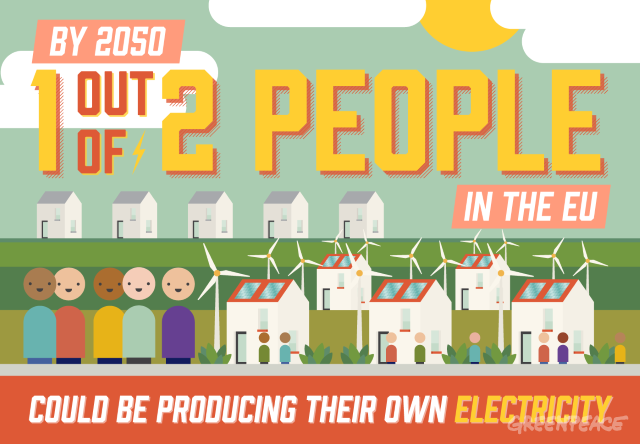A very interesting report produced by CE Delft- an environment-related research institute – suggests, and actually proves, the idea that the target of reaching a 100% renewable energy based economy is very much approachable if we, the people, become Energy Citizens.
Who is an Energy Citizen?
The definition is simple: an individual or a small group of people which produces energy or manages the energy consumption in a flexible way. Thus, it applies also to families or firms up to 50 employees. Or even the so called eco villages, like the example of ReGen in the Netherlands, which are basically groups of people who agreed to live sustainably and are to some extent independent from mainstream sources of livelihood.
Potentially these situations could be the normality for 50% of the European Union’s population by the year 2050. If this is the case 45% of the electricity demand would be supplied by energy citizens, as we are actually talking about 264 million people.
However such numbers look very far from the average European, who lives in a medium sized city, and has few possibilities to provide for her own energy demand. This does not mean that you are not an energy citizen. The measured propensity to follow a scheme of “ energy flexibility” is quite high, in fact, according to this number you may actually fall in these categories:
– 83% of the EU’s households could potentially become an energy citizen and contribute to renewable energy production, demand response and/or energy storage
– About half of the households, may have the potential to produce energy; even more could provide demand flexibility with their electric vehicles, smart e-boilers or stationary batteries
How did they come to this result?
In practice the study focused on these three aspects:
– the potential installed renewable energy capacity;
– the potential of renewable energy generation;
– the potential capacity for demand side flexibility (incl. storage).
Given these figures they computed the number of potential energy citizens.
Potential: this means, unluckily, that these results would not be reached under a BAU scenario.
Indeed! Greenpeace, which commissioned this study, suggests EU institutions to be less severe towards the matter of energy self-production and generation, as it claims that as of today our laws are too much stringent. Without such flexibility the goal of reaching the (approaching) goals of Europe 2020 (a little remainder: 20% of energy supply given by renewable) seems very far from being approached, in fact.
Italy: where are we?
As for the sunny country, in 2050 40% of Italians will be in some way related to the concept of energy citizen, with the highest contribution coming from households, rather than enterprises.
Of course, as trending now, the best performance would be the German one, reaching in 2050 almost 300 Twh of energy production in such a way.
Actually this report gives a sense of hope and faith, as signalling a very distinctive propensity of consumers to contribute to the fight against polluting production’s schemes.
You can find the whole report here.



